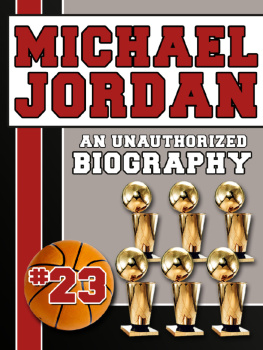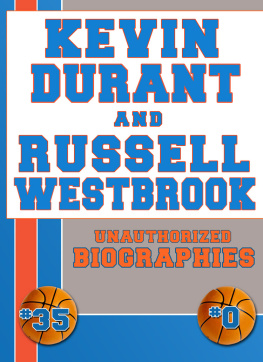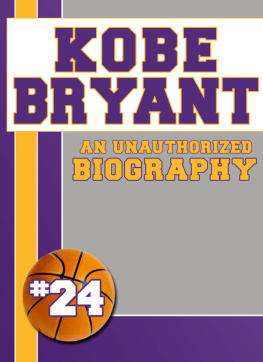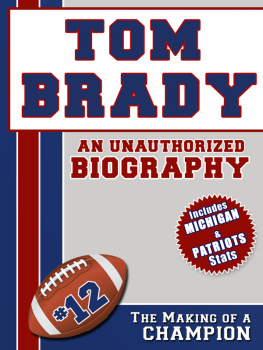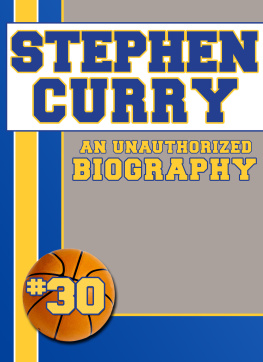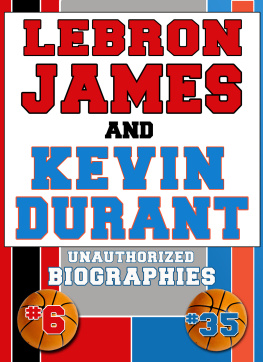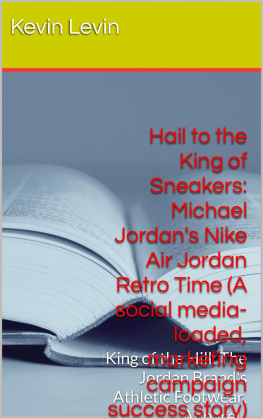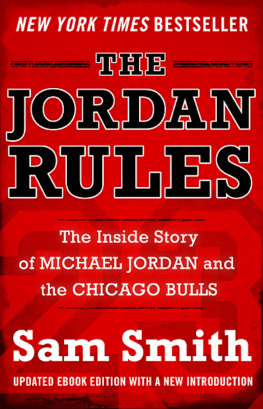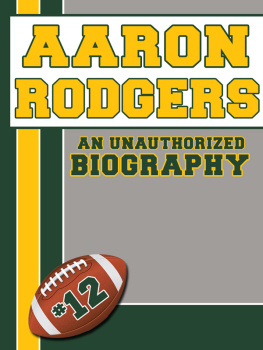
M ICHAEL J ORDAN
An Unauthorized Biography

Copyright 2014 by Belmont & Belcourt Biographies
All rights reserved. Neither this book nor any parts within it may be sold or reproduced in any form without permission.
eISBN: 9781619842953
Table Of Contents
I ntroduction
"There's Michael Jordan and then there is the rest of us."
Magic Johnson
Michael Jeffrey Jordan (born February 17, 1963), also known by his initials, MJ, is an American former professional basketball player, entrepreneur, and principal owner and chairman of the Charlotte Hornets. His biography on the National Basketball Association (NBA) website states, "By acclamation, Michael Jordan is the greatest basketball player of all time." Jordan was one of the most effectively marketed athletes of his generation and was considered instrumental in popularizing the NBA around the world in the 1980s and 1990s.
After a three-season career at the University of North Carolina at Chapel Hill, where he was a member of the Tar Heels' 1982 national championship team, Jordan joined the NBA's Chicago Bulls in 1984. He quickly emerged as a league star, entertaining crowds with his prolific scoring. His leaping ability, illustrated by slam dunk performances from the free throw line in slam dunk contests, earned him the nicknames, "Air Jordan" and "His Airness". He also gained a reputation for being one of the best defensive players in basketball. In 1991, he won his first NBA championship with the Bulls and followed that achievement with titles in 1992 and 1993, securing a "three-peat". Although Jordan abruptly retired from basketball before the beginning of the 199394 NBA season to pursue a career in baseball, he rejoined the Bulls in 1995 and led them to three additional championships in 1996, 1997, and 1998, as well as an NBA-record of 72 regular-season wins in the 199596 NBA season. Jordan retired for a second time in 1999 but returned for two more NBA seasons from 2001 to 2003 as a member of the Washington Wizards.
Jordan's individual accolades and accomplishments include five Most Valuable Player (MVP) Awards, ten All-NBA First Team designations, nine All-Defensive First Team honors, fourteen NBA All-Star Game appearances, three All-Star Game MVP Awards, ten scoring titles, three steals titles, six NBA Finals MVP Awards, and the 1988 NBA Defensive Player of the Year Award. Among his numerous accomplishments, Jordan holds the NBA records for highest career regular season scoring average (30.12 points per game) and highest career playoff scoring average (33.45 points per game). In 1999, he was named the greatest North American athlete of the 20th century by ESPN and was second to Babe Ruth on the Associated Press's list of athletes of the century.
He is a two-time inductee into the Basketball Hall of Fame in 2009 for his individual career and in 2010 as a member of the 1992 United States men's Olympic basketball team ("The Dream Team").
Jordan is also known for his product endorsements. He fueled the success of Nike's Air Jordan sneakers which were introduced in 1985 and remain popular today. Jordan also starred in the 1996 feature film Space Jam as himself. In 2008, he became part-owner and head of basketball operations for the Charlotte Bobcats and bought controlling interest in 2010.
Early years
Jordan was born in Brooklyn, New York, the son of Deloris, who worked in banking, and James R. Jordan, Sr., an equipment supervisor. His family moved to Wilmington, North Carolina when he was a toddler. Jordan attended Emsley A. Laney High School in Wilmington where he anchored his athletic career by playing baseball, football, and basketball. He tried out for the varsity basketball team during his sophomore year, but at 5'11" (1.80 m), he was deemed too short to play at that level. His taller friend, Harvest Leroy Smith, was the only sophomore to make the team.
Motivated to prove his worth, Jordan became the star of Laney's junior varsity squad and tallied several 40-point games. The following summer, he grew four inches (10 cm) and trained rigorously. Upon earning a spot on the varsity roster, Jordan averaged about 20 points per game over his final two seasons of high school play. As a senior, he was selected to the McDonald's All-American Team after averaging a triple-double: 29.2 points, 11.6 rebounds, and 10.1 assists.
Jordan was recruited by numerous college basketball programs, including Duke, North Carolina, South Carolina, Syracuse, and Virginia. In 1981, Jordan accepted a basketball scholarship at North Carolina where he majored in cultural geography. As a freshman in Coach Dean Smith's team-oriented system, he was named ACC Freshman of the Year after he averaged 13.4 points per game (PPG) on 53.4% shooting (field goal percentage). He made the game-winning jump shot in the 1982 NCAA Championship game against Georgetown which was led by future NBA rival Patrick Ewing. Jordan later described this shot as the major turning point in his basketball career. During his three seasons at North Carolina, he averaged 17.7 PPG on 54.0% shooting, and added 5.0 rebounds per game (RPG). He was selected by consensus to the NCAA All-American First Team in both his sophomore (1983) and junior (1984) seasons.
After winning the Naismith and the Wooden College Player of the Year awards in 1984, Jordan left North Carolina one year before his scheduled graduation to enter the 1984 NBA Draft. The Chicago Bulls selected Jordan with the third overall pick after Hakeem Olajuwon (Houston Rockets) and Sam Bowie (Portland Trail Blazers). One of the primary reasons why Jordan was not drafted sooner was that the first two teams were in need of a center. However, the Trail Blazers general manager Stu Inman contested that it was not a matter of drafting a center, but more a matter of taking Sam Bowie over Jordan, in part because Portland already had a guard with similar skills to Jordan, Clyde Drexler. In 2005 ESPN, citing Bowie's injury-laden college career, named the Blazers' choice of Bowie as the worst draft pick in North American professional sports history. Jordan returned to North Carolina to complete his degree in 1986.
Professional career
Early NBA years (19841987)
During his first season in the NBA, Jordan averaged 28.2 PPG on 51.5% shooting. He quickly became a fan favorite even in opposing arenas and appeared on the cover of Sports Illustrated with the heading "A Star Is Born" just over a month into his professional career. Jordan was also voted in as an All-Star starter by the fans in his rookie season. Controversy arose before the All-Star game when word surfaced that several veteran players, led by Isiah Thomas, were upset by the amount of attention Jordan was receiving. This led to a so-called "freeze-out" on Jordan, where players refused to pass him the ball throughout the game. The controversy left Jordan relatively unaffected when he returned to regular season play, and he would go on to nab Rookie of the Year. The Bulls finished the season 3844 and lost in the first round of the playoffs in four games to the Milwaukee Bucks.
Jordan's second season was cut short by a broken foot in the third game of the season, which caused him to miss 64 games. Despite Jordan's injury and a 3052 record (at the time, fifth worst record of any team to qualify for the playoffs in NBA history), the Bulls made the playoffs. Jordan recovered in time to participate in the playoffs and performed well. Against a 198586 Boston Celtics team that is often considered one of the greatest in NBA history, Jordan set the still-unbroken record for points in a playoff game with 63 in Game 2. The Celtics, however, managed to sweep the series.
Next page
